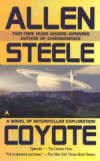The young assassin Celaena Sardothien is serving a life sentence in a forced labour mine when the Dorian, Crown Prince of Adarlan, retrieves her and takes her to the capital. She is to take part in a series of competition with a variety of soldiers, mercenaries, assassins and thieves. The prize is to be appointed Royal Assassin for four years, during which the winner would earn their freedom. Once at the Glass Palace, she is drawn into a web of intrigue, and dark magic is afoot in the bowels of the castle.
This young adult low fantasy tale is rather unevenly paced, and its strong romance traits work against it. Celaena’s story and background, and the bits where there is actually action and intrigue, are quite interesting. The drawn-out sections of love triangle, with trite expositions about feelings, are quite tedious. Celaena is one of those characters who is good at everything, so there is little suspense regarding the final outcome, especially since this book is followed by six more. The hints at her heritage being more than it seems are heavy-handed and far too obvious. Her only redeeming qualities are her temper and her unwillingness to be meek and submissive.






























